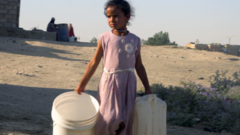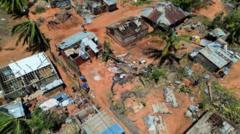Turkish air strikes have significantly affected the water supply in northeastern Syria, leaving over a million people in Hassakeh reliant on tanker deliveries for water. Experts assert that the attacks, targeting Kurdish-held regions during a period of extreme drought, may violate international law amid an ongoing civil war and climate change challenges.
Humanitarian Crisis Deepens as Turkish Strikes Disrupt Water Supply in Northeastern Syria

Humanitarian Crisis Deepens as Turkish Strikes Disrupt Water Supply in Northeastern Syria
Over one million residents in Hassakeh face severe water shortages due to Turkish air strikes, raising concerns over potential violations of international law and exacerbating an ongoing humanitarian crisis.
Turkish air strikes in drought-stricken north-eastern Syria have dismantled access to essential electricity and water services, etching a grim reality for over a million individuals who were reliant on these resources. Recent assessments indicate that Turkish military actions, having executed over 100 strikes between October 2019 and January 2024, have compounded the humanitarian crisis in the Kurdish-controlled Autonomous Administration of North and East Syria (AANES).
Reports from independent sources detail that since the attacks on electrical infrastructures commenced in October of last year, the primary water station in Alouk has become non-operational. This has forced residents in Hassakeh to depend on deliveries of water transported over long distances, straining already limited resources in a region marred by civil conflict and environmental crises brought on by years of intense drought linked to climate change.
Turkey maintains that their military actions are justified and aimed at neutralizing what it describes as "terrorist" groups, particularly the Kurdish militias linked to the Kurdistan Workers’ Party (PKK). Istanbul asserts that infrastructure and energy facilities connected to these groups are legitimate military targets. However, this assertion sits uneasily with humanitarian organizations and local residents, who emphasize the dire circumstances that millions now face.
Local officials stress that without consistent water deliveries, civilians are forced into desperate situations, leading to conflicts over dwindling supplies. "Water is more precious than gold here," one local tanker driver lamented, highlighting the extreme measures individuals resort to in their search for water.
As international bodies scrutinize these military actions, legal experts argue that the Turkish strikes may violate international humanitarian law, particularly given the subsequent impact on civilian life. A report by the UN has suggested that the Turkish actions could amount to war crimes by depriving civilians of access to essential resources.
The compounded effects of this humanitarian crisis are alarming, as residents feel increasingly neglected amidst a backdrop of ongoing conflict. As they call for immediate assistance, both Turkish authorities and humanitarian organizations face mounting pressure to address the unfolding tragedy in northeastern Syria.




















